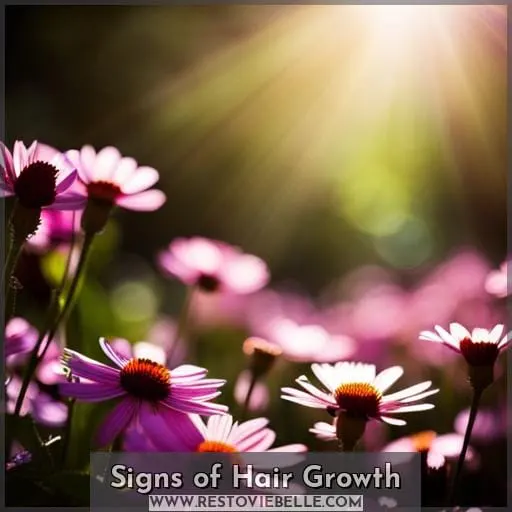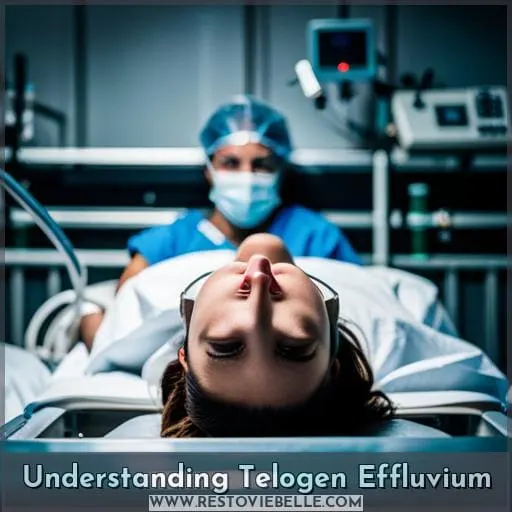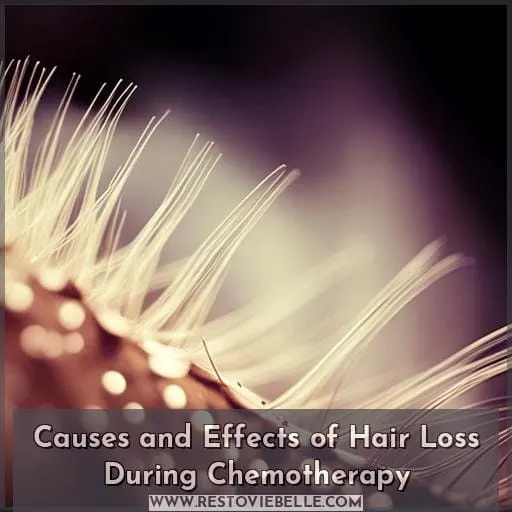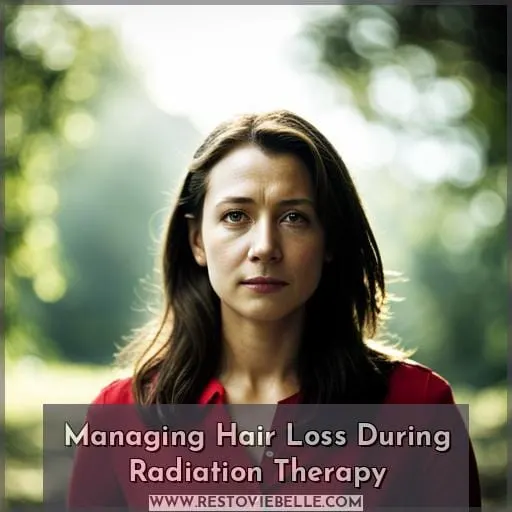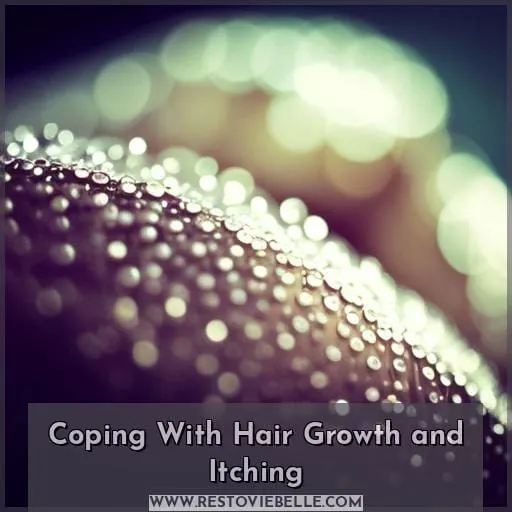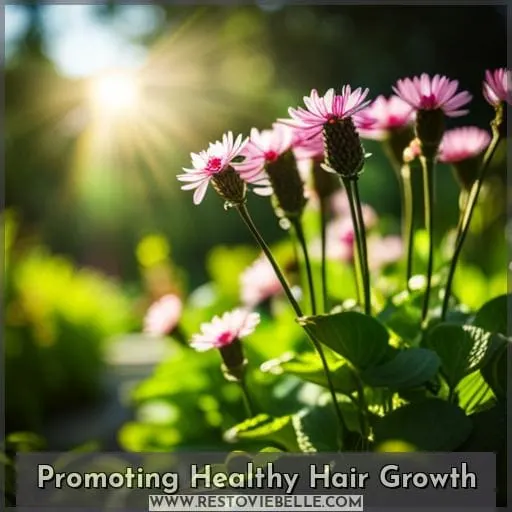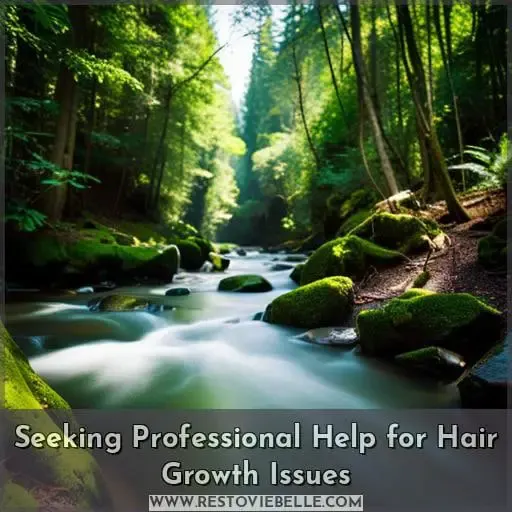This site is supported by our readers. We may earn a commission, at no cost to you, if you purchase through links.
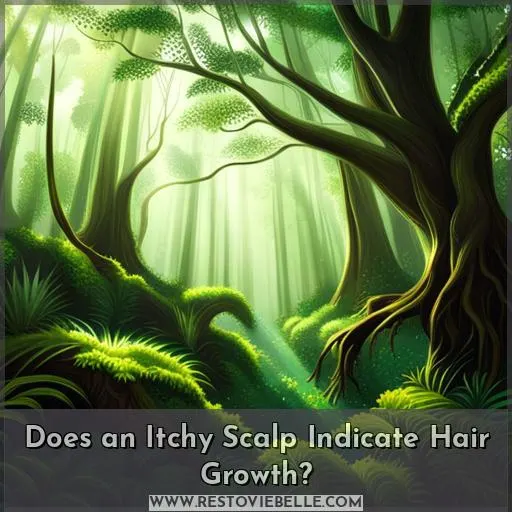 Have you ever wondered whether an itchy scalp could be a sign of hair growth? For many people, the answer is yes. As your hair grows, you may experience itchiness due to new hairs pushing out old ones.
Have you ever wondered whether an itchy scalp could be a sign of hair growth? For many people, the answer is yes. As your hair grows, you may experience itchiness due to new hairs pushing out old ones.
Additionally, certain medical conditions can cause temporary thinning or loss of hair along with itching and discomfort on the scalp.
Table Of Contents
Key Takeaways
- Itchy scalp can be a sign of hair growth.
- New hair growth may cause tingling and dark patches on the scalp.
- Baby hair near the hairline indicates potential regrowth.
- Rapid hair growth suggests healthy follicle activity.
Signs of Hair Growth
You may have noticed a dark patch of hair on your head or perhaps some baby hair appearing out of nowhere.
Dark Patch of Hair on Head
If you notice a dark patch of hair on your head, it could be a sign that new hair is growing due to healthy follicle activity. An itchy scalp might accompany the appearance: tingling, baby hairs or peach fuzz indicate potential regrowth; minimal shedding and breakage signify health.
Baby Hair on Adults
You may notice the appearance of baby hair, or fine, wispy strands near your hairline. This is a sign of new growth in the anagen phase and suggests potential regrowth from thinning hair. A scalp examination can help determine if this is a result of healthy follicles or inflammation related to loss.
Itching can accompany both scenarios; relief often comes with proper care and treatments like minoxidil for fast results. A healthy diet also supports growth while preventing further damage to hairs on their journey toward maturity.
Rapid Hair Growth
Rapid hair growth can be an indication of healthy follicle activity. Scalp itching may accompany new strands, as well as nutrient-rich diets and scalp cooling caps. Breakage is reduced with rapid growth, while thinning or baldness may respond to multivitamins and minoxidil treatments.
Preventive measures include stress management and avoiding extreme dieting for optimal results in hair regrowth.
Little Hair Shedding
Minimal hair shedding and reduced breakage indicate healthy, growing hair. Scalp itching can be a sign of regrowth, though it does not always mean new follicles are forming. Hair loss causes like stress or the telogen phase can also cause scalp irritation.
Tingling Scalp
A tingling scalp could be either inflammation surrounding hair loss or new growth. Signs of healthy regrowth include dark spots, wispy strands, peach fuzz, rapid growth, and reduced breakage. Foods with nutrients help support it. Tingling may accompany these changes, but if not present, it doesn’t mean no progress! The hair life cycle and treatment for telogen effluvium can aid in a successful prognosis against hair loss.
Understanding Telogen Effluvium
Telogen effluvium is a type of hair loss that affects the telogen stage of hair growth. It typically occurs when an external stressor or body change triggers the premature shedding of up to 300 hairs per day.
Acute telogen effluvium usually lasts less than 6 months, while chronic forms can persist for longer periods and may affect women aged 30-60 most severely.
Common triggers include fever, childbirth, stress, surgery, and thyroid issues, as well as certain medications and dietary changes.
Telogen effluvium does not impact physical health but can lead to emotional distress. Fortunately, it is not contagious, so sufferers needn’t worry about spread through contact with others.
Difference Between Acute and Chronic Telogen Effluvium
Telogen effluvium is a type of temporary hair loss due to stress or body changes. It’s divided into acute and chronic forms, both with various triggers, diagnostic tests, treatments, and emotional impacts.
| Acute | Chronic | |
|---|---|---|
| Duration: 6 months | Triggers: Common | Triggers: Uncommon |
| Diagnostic Tests: Pull test | Diagnostic Tests: Blood work | |
| Treatment Options: Minoxidil | Treatment Options: Multivitamins | |
| Emotional Impact: Minimal | Emotional Impact: Severe |
While the itching scalp associated with telogen effluvium may signify regrowth in some cases, it doesn’t always mean new hair is forming. Without treatment options like minoxidil or multivitamin intake, however, its effects can be long-lasting for those suffering from chronic telogen effluvium.
Despite this outcome being largely dependent on individual circumstances, the outlook remains positive as most affected individuals experience full recovery within 3-6 months after initiating appropriate therapy.
Who Does Telogen Effluvium Affect?
Women aged 30-60 are particularly vulnerable to the effects of chronic telogen effluvium. Stress, surgery, and diet changes can trigger it; symptoms include daily hair shedding. Hair loss prevention includes stress management, nutrient-rich foods, and adequate sleep.
Coping with telogen effluvium requires understanding its duration and triggers to help prevent it from recurring in the future.
Common Triggers of Telogen Effluvium
Common triggers of telogen effluvium? Fever, childbirth, stressors, surgery, and thyroid issues – plus meds & diet changes. Stress-related hair loss can be caused by events like these. Hair shedding causes vary: telogen effluvium stressors range from physical to emotional strain.
Hair loss factors include anagen & catagen phases; vitamins for hair support regrowth after treatment is complete.
Effects of Telogen Effluvium on the Body
When you experience a sudden change in your body, it can have an impact on hair growth and lead to telogen effluvium.
- Emotional stress due to visible hair loss
- Hair regrowth taking 3-6 months after treatment ends
- Stress management and diagnosis process for underlying conditions needed if suspected of causing TE
Prescriptions like minoxidil could speed up the regrowth process, while avoiding extreme diets or rapid weight loss is advisable for preventing future occurrences of telogen effluvium’s temporary but emotionally taxing effects on the body and mind.
Contagiousness of Telogen Effluvium
Though it is often caused by an internal change, telogen effluvium cannot be spread from person to person. It’s a temporary hair loss condition triggered by emotional or physical stressors and can last 3-6 months.
Treatment options include minoxidil, multivitamins, and styling techniques for improved prognosis. Prevention strategies like balanced dieting will help reduce triggers while avoiding permanent conditions like androgenic alopecia.
Hair regrowth should occur after treatment, but gentle care is essential during the process to prevent damage to new strands emerging in the exogen phase.
Causes and Effects of Hair Loss During Chemotherapy
Hair loss is a common side effect of chemotherapy and can range from mild to severe. It typically starts 2-4 weeks after treatment begins, with regrowth taking 3-6 months afterward. To understand why hair loss occurs during chemotherapy and how it affects the body, as well as strategies to prevent or reduce its effects on your hair, read on for more information.
Why Does Hair Loss Occur?
It’s important to understand why hair loss occurs during chemotherapy, as it can lead to uncomfortable and even permanent effects. Scalp itching, triggered hair growth, managing chemotherapy-induced baldness, radiation-induced thinning, and coping with regrowth are all factors in this process.
Hair may become brittle or break off due to cancer treatment or radiation therapy. Minoxidil may help speed up the regrowth process but is not a guarantee of full coverage on its own.
Protecting the scalp from extreme temperatures while finding ways of dealing with any emotional stress caused by hair loss are essential steps for successful recovery after chemo treatments have ended.
What to Expect During Hair Loss
As you experience hair loss, you may notice tingling sensations on your scalp or the emergence of dark spots and fine strands. These could indicate new hair growth or a sign that healthy follicles are making a comeback.
A nutritious diet is key for healthy hair care; opt for Mediterranean favorites like eggs, berries, avocados, and leafy greens to support regrowth.
If your scalp itches during this process, use gentle products and cool compresses as remedies.
Hair Regrowth After Treatment
After treatment has ended, you may experience the regrowth of your hair. New strands will begin to emerge as dark patches around follicles. Baby hairs near the hairline or soft peach fuzz are signs of a successful recovery.
Healthy growth is marked by minimal shedding and breakage, and nutrient-rich foods can further support it. A tingling scalp could mean inflammation or new growth – but don’t rely on it alone! Hair regrowth post-therapy brings success after a difficult journey; be sure to take care with gentle styling techniques for fragile new hair.
Strategies to Prevent Hair Loss
To protect your locks, consider strategies to prevent hair loss during chemotherapy, such as scalp cooling caps and gentle hair care, like a knight defending his castle. Dietary support, debunking myths about baldness, and scalp health are key for prevention.
Hair Care Tips During Treatment
Gently nourish your head during treatment to minimize hair damage. Shield your scalp from the sun and cold while using moisturizing, gentle shampoos and conditioners. Consider getting a short cut to appear fuller until new strands grow in. Avoid using styling products that can harm fragile hairs regrowing after radiation therapy or chemotherapy-induced loss.
Managing Hair Loss During Radiation Therapy
Radiation therapy can cause hair loss, and it is important to take precautions when undergoing the treatment. Protecting your skin from radiation-induced damage with protective gear is essential, as there may be potential for permanent hair loss.
Hair care tips during and after radiation therapy include using gentle products while styling fragile new growth that may appear different in color or texture than pre-treatment hair.
How Does Radiation Therapy Cause Hair Loss?
Radiation therapy can cause hair loss, sometimes even permanently depending on the dose. It affects the treated area only, and skin protection is essential. Hair regrowth can take several months after treatment, but new hair may have a different texture or color.
Scalp itching may be present as well, which could indicate either inflammation accompanying hair loss or potential regrowth of thinning hairs. Early awareness of causes and effects is key for successful management of radiation-induced hair loss.
Protecting the Skin During Radiation Therapy
When undergoing radiation therapy, it’s important to protect your skin with sunscreen and other protective measures. Wear a hat or scarf when outdoors; avoid direct sunlight as much as possible. Keep hair care gentle – styling products and heating devices can damage fragile new hair growth.
Consider head coverings while going through treatment, such as wigs or scarves for scalp itching relief during regrowth periods. Coping strategies like stress management, balanced dieting, and regular sleep patterns are also helpful in managing the transition period of radiation-induced hair loss.
Potential for Permanent Hair Loss
Be aware that radiation therapy may cause permanent hair loss in some cases. Hair regrowth won’t occur, leaving long-term effects on the scalp. Itching is often a symptom of this and can be an indicator of whether or not you’ll experience permanent consequences from your treatment.
Radiation therapy should always be taken seriously to avoid any potential for irreversible damage to your hair follicles and scalp’s health.
Hair Care Tips During and After Radiation Therapy
To protect delicate hair during and after radiation therapy, take special precautions. Shield it from the sun and cold. Use gentle care and avoid styling products or devices. Maintain scalp protection, watch for signs of regrowth, and expect texture changes in new hair.
Coping With Hair Growth and Itching
Do you experience itching when your hair is growing? Scalp itching during the hair growth process can be uncomfortable and distracting, but it’s actually a sign of healthy, active follicles. You should expect some tingling sensation as well as dark patches around the follicles, baby hairs near the scalp line, or peach fuzz on thinning areas.
To help relieve this irritation, try using moisturizing shampoo and conditioner; avoid too-frequent washing or overstyling; massage in essential oils like lavender or rosemary.
Why Does the Scalp Itch During Hair Growth?
It’s common to experience an uncomfortable tingling sensation as your follicles stimulate new growth. An itchy scalp is a sign of healthy hair, but proper care and maintenance are important for achieving this goal.
Taking supplements, eating nutrient-rich foods, avoiding stressors and excessive styling can help support the natural process of hair regrowth while reducing itchiness. To prevent damage from occurring during the growing phase, use gentle products that won’t irritate or dry out your skin or cause further inflammation.
What to Expect During Hair Growth
You may experience an array of sensations as your tresses begin to thrive. A tickling scalp, baby hair at the hairline, and a peach fuzz feel are all common signs that new growth is on its way. For relief from itchy scalps during this time, nourish locks with nutrient-rich foods and gentle hair care products for healthy regrowth.
Tips to Relieve Scalp Itching
Experiencing an occasional tingle on your head can be a sign of new hair growth or inflammation associated with shedding. To relieve an itchy scalp, try anti-itch remedies like aloe vera gel and cool compresses.
Gentle brushing and shampooing may also provide relief by stimulating natural oils. For extra soothing, use essential oils containing lavender or chamomile in scalp massages to reduce irritation.
Proper Hair Care During Hair Growth
To ensure strong, healthy hair growth, it’s important to practice proper scalp care during the various phases of hair growth. Wash and condition regularly with gentle products designed for your hair type. Avoid harsh styling tools or aggressive brushing; use a wide-toothed comb instead.
Massage nourishing oils into the scalp once a week to stimulate circulation and provide moisture and nutrients for follicle health.
Promoting Healthy Hair Growth
To promote healthy hair growth, consider incorporating nutrient-rich foods, such as eggs, berries, and leafy greens into your diet. Additionally, taking time to regularly care for your hair with gentle techniques like scalp massage can help encourage new growth.
Nutrient-Rich Foods for Hair Growth
Nourish your body with nutrient-rich foods like eggs, berries, avocados, and leafy greens to support healthy follicle activity. Enhance your dietary hair health by incorporating supplements into meals that are packed with nutrients.
Keep scalp itching at bay while promoting growth through regular consumption of these ingredients.
Hair Care Tips for Healthy Hair
Taking care of your hair is key for healthy locks. Nourish it with nutrient-rich foods, protect the scalp during treatments like radiation therapy to keep the mane looking glossy. Hair care tips: Scalp massage; avoid styling products; prevent breakage by using gentle brushing and combing techniques; wear a hat in the sun or cold weather.
Scalp Massage and Hair Growth
Gently kneading your head can help boost hair growth. Scalp massages increase circulation and reduce tension, promoting a healthy scalp. Massage helps stimulate follicles for increased hair volume and thickness. A tingly or itchy sensation signals new strands growing in the Anagen phase! Regular massage boosts blood flow to nourish cells, increasing the vitality of existing locks.
Avoiding Factors That Inhibit Hair Growth
To promote healthy hair growth, it’s important to avoid factors that inhibit the process. Like a boulder blocking a stream, extreme diets and rapid weight loss are particularly detrimental. A healthy scalp is essential for encouraging new growth; nutrient-rich foods help nourish follicles and reduce itching or inflammation.
| Hair Growth Inhibitors | Healthy Scalp Habits |
|---|---|
| Extreme Diets | Nutrient-Rich Foods |
| Rapid Weight Loss | Scalp Massages |
| Stress |
Seeking Professional Help for Hair Growth Issues
If you’re noticing changes in your hair growth, such as excessive shedding or a lack of regrowth, it may be time to consult with a doctor. Hair growth issues can range from telogen effluvium and chemotherapy-induced alopecia to radiation-induced hair loss and more.
Your physician can assess the situation through tests like blood work or a scalp biopsy and offer treatments such as minoxidil, multivitamins, scalp cooling caps, or lifestyle modifications that aim to restore healthy hair growth.
When to Consult a Doctor
If you are experiencing sudden hair loss or thinning, it may be time to consult a doctor. Itchy scalps can indicate new hair growth and should not be ignored. Seek medical advice if scalp itching is accompanied by any other symptoms like dark patches around the follicles or an increase in shedding.
A doctor will assess your condition and advise on suitable treatment options that could help promote healthy hair growth again.
Tests and Diagnosis for Hair Growth Problems
Seeing a doctor can be an important step in diagnosing any underlying issues causing hair growth problems, so don’t hesitate to book an appointment if you’re concerned.
- Scalp Itching Assessments
- Hair Growth Tests
- Diagnostic Methods for Health Issues
- Hair Health Assessment and Evaluation
- Specific Evaluations of the Problem Areas of Growth Concerns
These tests can help determine the cause and prescribe relevant treatments that target your specific needs or conditions accurately – enabling better results from treatments such as minoxidil, vitamins, or even lifestyle adjustments like stress management techniques tailored to your individual situation!
Treatment Options for Hair Growth Issues
Exploring treatment options for hair growth issues can help you regain confidence and feel empowered. Scalp itching is one indicator of regrowth, which may be addressed with supplements or topical treatments like serums.
Lifestyle factors such as diet, sleep, and stress management should not be overlooked either.
Conclusion
Hair growth can be a complex and stressful process, but understanding the signs and causes can help you manage it more effectively. Many people experience an itchy scalp when their hair is growing. This can be a sign of new hair growth, telogen effluvium, chemotherapy-induced hair loss, or radiation-induced hair loss.
Knowing the cause is important in order to find the appropriate treatment and manage your hair growth.
Nutrient-rich foods, scalp massage, and gentle hair care can all help to promote healthy hair growth. If you suspect you may be suffering from hair growth issues, it is important to seek professional help, as certain treatments may be necessary to address the underlying cause.
With proper care and understanding, you can manage your hair growth and keep your scalp healthy.
